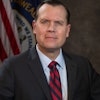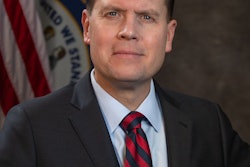 Chancellor Joe Garcia
Chancellor Joe Garcia
“My passion has always been equity in higher education,” says Garcia, whose dedication to addressing disparities in how institutions serve students of color began during his undergraduate years. As a member of United Mexican American Students (UMAS) and later the Harvard Chicano Law Student Association, Garcia witnessed firsthand the challenges facing underrepresented populations in both public and private educational settings.
Garcia’s career path has been anything but conventional. Before assuming his role as Chancellor, he served as president of an HSI (Hispanic-Serving Institution) , Co lorado State University Pueblo, and prior to that, as president of Pikes Peak Community College. His journey took an unexpected turn when he was tapped for a six-year stint as Colorado’s Lieutenant Governor—a position he initially declined.
“I loved what I was doing,” Garcia explains. The solution came through unprecedented flexibility: a law was passed allowing him to simultaneously serve as Lieutenant Governor and executive director of the Colorado Department of Higher Education.
This dual role meant maintaining offices in two buildings— one at the Capitol and another at the Department of Higher Education—allowing him to continue his educational advocacy while serving in state government.
This unique arrangement provided valuable perspective. “It was very helpful to me to look at higher education through the eyes of a legislator, where so much of what they’re focused on is how we build a competitive workforce, how we control costs, how we don’t just serve individual student needs, but state needs,” Garcia says.
Perhaps Garcia’s most significant achievement has been transforming the leadership landscape within the Colorado Community College System. During his tenure, he hired 11 of the system’s 13 presidents, creating a leadership team that genuinely reflects the diverse student population they serve. “More than half of our presidents now are women.
More than half of those women are women of color,” Garcia notes with pride. “We have bilingual presidents of Latino descent. We have a gay president in a rural community at a rural college. All of them are doing great.”
This achievement holds special significance for Garcia, who remembers when he was one of just four Latino presidents in the system—all of whom departed within a couple of years. He emphasizes that this diversification never came at the expense of quality. “These were all folks who went through our process and came out as number one candidates before I ever met them,” he clarifies.
Dr. Mordecai Brownlee, President of the Community College of Aurora and a regular contributor to Diverse, stands as living proof of Garcia’s transformative leadership approach.
“Chancellor Joe Garcia changed the trajectory of my life. At the age of 35, he entrusted me with the opportunity to serve as president of the Community College of Aurora— an act of belief that I will never forget,” says Brownlee. “Serving, studying, and being mentored by this living legend has been the blessing of a lifetime. His leadership has transformed lives and institutions across Colorado, and I am a proud product of that legacy.”
Garcia’s talent for identifying and nurturing leadership extends beyond mere recruitment. He understands that creating a supportive environment is equally crucial for retention.
“All of our presidents of color told me that before they applied, they called people and asked them, ‘So what’s the Colorado system like? What’s Joe Garcia like? Is that a place where I can be successful?’” Only after receiving positive feedback about the supportive culture did these talented individuals apply.
The challenges facing community colleges remain substantial. Garcia identifies persistent funding limitations in Colorado and countering the narrative that higher education “isn’t worth it” as significant hurdles. He stresses the importance of using data to demonstrate that “once you come and get your post-secondary credential, you will have a happier, more fulfilling, and more economically productive life.”
Another challenge is adapting to changing demographics. With declining numbers of traditional college-age white middle-class students, Garcia emphasizes the necessity of effectively reaching lower-income, first-generation students and students of color.
“Even if we educated every single white high school graduate in the country, there’s not enough to meet our economic needs to fill the jobs that we’re going to have here in the future,” he notes.
Community colleges serve the largest proportion of first-generation students, low-income students, students of color, and non-traditional students— populations critical to America’s economic future. Yet they often struggle with retention and graduation metrics. Garcia advocates for a more nuanced understanding of student success, recognizing that many “skill builders” attend community college to acquire specific skills rather than degrees.
Despite these challenges, Garcia remains optimistic about the future, particularly in Colorado.
“I’m absolutely hopeful, especially here in Colorado, because of the quality of young leaders that we have in place now, and because they bring a very collaborative approach to supporting each other as we build the system to better serve students across the state,” he says.
As graduation season unfolds, Garcia finds renewed inspiration in witnessing the impact of community college education.
“I know what we do is important, but I know what our students will do with the education they receive is even more important,” he adds.









